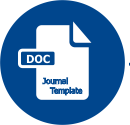Copyright Notice
Authors who publish with JOURNAL OF FOOD AND CULINARY agree to the following terms:
- All articles published are Open Access that means they will be immediately and permanently free for everyone to read and download. We use the CC-BY-SA license options under Creative Commons Attribution License (CC BY-SA 4.0). Creative Commons Attribution License (CC BY-SA 4.0). CC-BY-SA assures that all works will be available under CC-BY-SA always and no risk of commercial actions against the will of the copyright holder.
- Anyone can use, copy and disseminate the material in any medium or format; as well as re-use, re-mix, transform, and build upon the material for any purpose, even commercially. However, they must acknowledge the authors by giving appropriate credits (cite to the article or content), provide a link to the license, and indicate if changes were made and use under the same license as the original.
- Authors retain copyright and grant license exclusive rights in their article to Universitas Ahmad Dahlan as publisher of the JOURNAL OF FOOD AND CULINARY.
- Authors have the right to retain patent, trademark and other intellectual property rights (including research data).
- Authors have the right to proper attribution and credit for the published work.
Copyright Transfer Agreement
- The Authors submitting the manuscripts do so on the understanding that if they are accepted for publications, copyright of the articles shall be assigned to Universitas Ahmad Dahlan as publisher of the JOURNAL OF FOOD AND CULINARY.
- Universitas Ahmad Dahlan as publisher of The JOURNAL OF FOOD AND CULINARY, the Editors, and the Editorial Board Members of the JOURNAL OF FOOD AND CULINARY make every efforts to ensure that no wrong or misleading data, opinions or statements are published in the journal. In any way, the contents of the articles and circulars published in the JOURNAL OF FOOD AND CULINARY are the sole and exclusive responsibility of their respective authors and advertisers.
- The publisher may revoke the publication for violating the ethical code of conduct.





